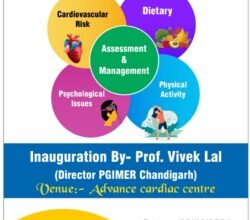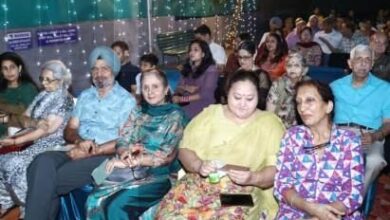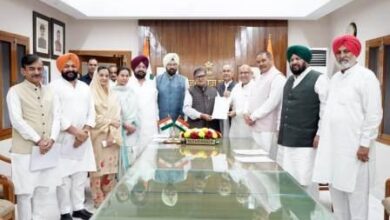Another Himachal Family Braves Their Own Tragedy to Save Others’ Lives With Transplantation of Heart at AIIMS Delhi sent through Green Corridor & Kidneys, Pancreas & Corneas here at PGIMER


Chandigarh : January 10 : Following the footsteps of other brave heart donor families, another heroic family of Himachal Pradesh showcased a rare example of compassion and unconditional love by consenting to donate organs of their deceased dear one, Nisha Thakur, 43 years, from Sundernagar, Mandi, Himachal Pradesh.
This courageous gesture of the donor family impacted five lives in all including one in AIIMS Delhi with the transplantation of heart sent through Green Corridor and four here in PGIMER with the transplantation of Kidneys, Pancreas and Corneas.
Paying his obeisance to the deceased donor, Prof. Surjeet Singh, Director PGIMER stated, “As life ends for one person, it is just beginning for someone else. That is the bittersweet reality of organ donation. It is an extremely hard decision amid immense grief for the donor family, but families like that of donor Nisha Thakur definitely instill a sense of confidence and a ray of hope. It is through their generous gifts that hundreds of people each year are given a second chance at life,”
The family of the 39 year old heart recipient from Ghaziabad, Uttar Pradesh is overwhelmed as she is recovering at AIIMS New Delhi post the transplant. Expressing their sentiments, the indebted family said, “The donor has given our family member a second chance in life. Now she will be able to accomplish things that were inconceivable before. We know that no words we could possibly say could free the donor family from the grief of their overwhelming loss, but their selfless gesture is unparalleled.”
Before that fateful day of 02nd January, everything was perfect in Nisha Thakur’s family, but destiny had something else in-store for them when the deceased, Mrs Nisha Thakur, while going on a scooter with her husband Dinesh Kumar Thakur, fell down from the pillion and received fatal head injuries, when her husband applied breaks to save a passer-by.
Critically injured, Mrs Nisha Thakur was rushed to a nearby hospital in Mohali. Due to a worsening prognosis, she was shifted to PGIMER on the same day. Her condition being irretrievable, she finally succumbed to her injuries and was declared brain-dead following the THOA protocols on 05th January.
But even in this darkest hour, the bereaved husband Dinesh Kumar Thakur showed exceptional courage and magnanimity by consenting to donate the organs of his deceased wife when transplant coordinators on duty at PGIMER counseled him to consider the same.
“It is my wife’s chance to live through others. With the organ donation, at least we will be able to save some other families from the pain and trauma that we are going through with my wife’s death,” stated resolute Dinesh Kumar Thakur as he consented for organ donation, holding back his own tears.
Prof. Vipin Koushal, Medical Superintendent PGIMER and Nodal Officer, ROTTO (North), while detailing about the latest case, said, “Following the family’s consent, we retrieved heart, kidneys, pancreas. and corneas. Once the donor organs became available, everyone involved in the transplant from multiple departments got into action to translate the noble wish of the family into reality. As the cross-matching indicated no matching recipient for heart in PGIMER, we immediately got in touch with other transplant hospitals to explore options for matching recipients, and finally, the heart was allocated to a matching recipient admitted in AIIMS, New Delhi with the intervention of NOTTO.”
Elaborating about the Green Corridor created for the case, Prof. Koushal, shared, “To ensure safe and speedy transport of the harvested organs, a Green Corridor was created in conjunction with the retrieval timings from PGIMER to Technical AirPort Chandigarh for the transportation of retrieved heart for the onward flight to Delhi at around 01.05 pm on 6th January.”
The deceased’s pancreas and kidneys were used for two terminally ill renal failure patients, giving them a second chance to life and the corneas were used for another two patients, restoring their sight here in PGIMER.
Sharing his concerns, Prof. Koushal further said, “The country really needs to improve the rate of organ donation. Synergised efforts and engagement of the civil society, religious leaders and other stakeholders are required for creating more public awareness about the cause, which will help saving precious lives.”




